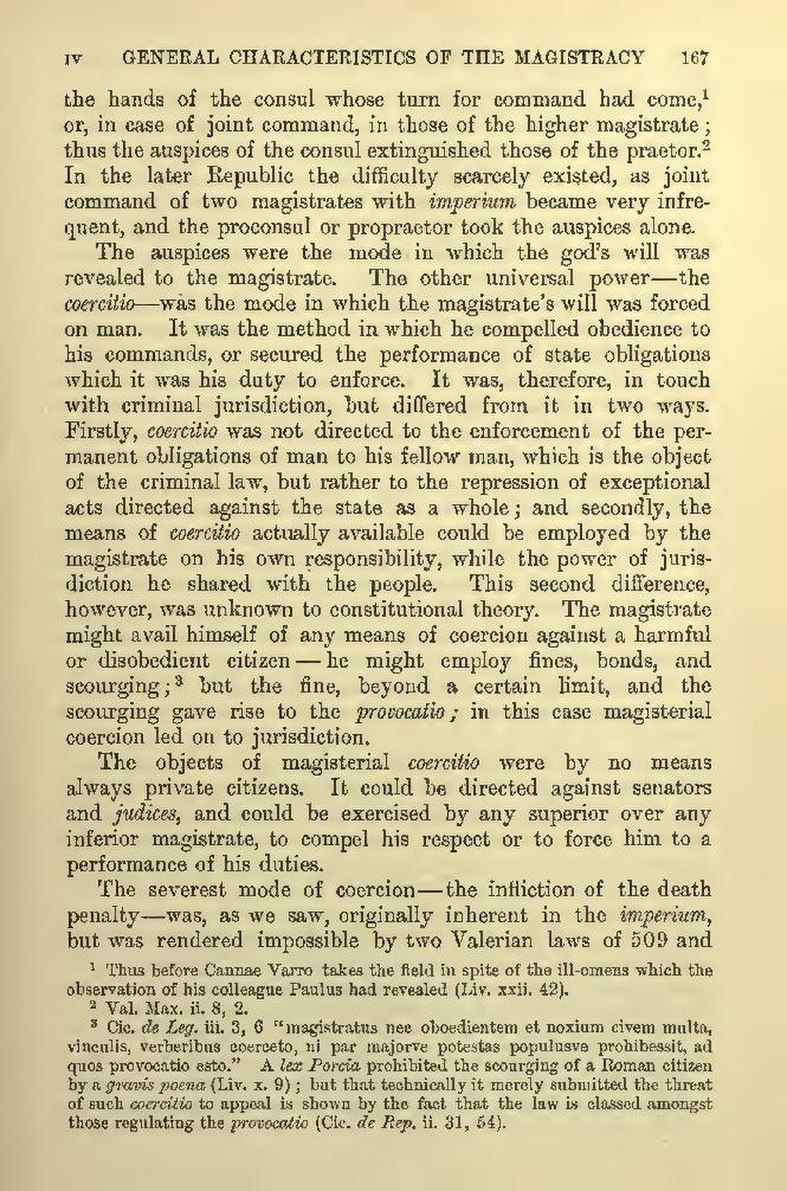the hands of the consul whose turn for command had come,[1] or, in case of joint command, in those of the higher magistrate; thus the auspices of the consul extinguished those of the praetor.[2] In the later Republic the difficulty scarcely existed, as joint command of two magistrates with imperium became very infrequent, and the proconsul or propraetor took the auspices alone.
The auspices were the mode in which the god's will was revealed to the magistrate. The other universal power—the coercitio—was the mode in which the magistrate's will was forced on man. It was the method in which he compelled obedience to his commands, or secured the performance of state obligations which it was his duty to enforce. It was, therefore, in touch with criminal jurisdiction, but differed from it in two ways. Firstly, coercitio was not directed to the enforcement of the permanent obligations of man to his fellow man, which is the object of the criminal law, but rather to the repression of exceptional acts directed against the state as a whole; and secondly, the means of coercitio actually available could be employed by the magistrate on his own responsibility, while the power of jurisdiction he shared with the people. This second difference, however, was unknown to constitutional theory. The magistrate might avail himself of any means of coercion against a harmful or disobedient citizen—he might employ fines, bonds, and scourging;[3] but the fine, beyond a certain limit, and the scourging gave rise to the provocatio; in this case magisterial coercion led on to jurisdiction.
The objects of magisterial coercitio were by no means always private citizens. It could be directed against senators and judices, and could be exercised by any superior over any inferior magistrate, to compel his respect or to force him to a performance of his duties.
The severest mode of coercion—the infliction of the death penalty—was, as we saw, originally inherent in the imperium, but was rendered impossible by two Valerian laws of 509 and
- ↑ Thus before Cannae Varro takes the field in spite of the ill-omens which the observation of his colleague Paulus had revealed (Liv. xxii. 42).
- ↑ Val. Max. ii. 8, 2.
- ↑ Cic. de Leg. iii. 3, 6 "magistratus nec oboedientem et noxium civem multa, vinculis, verberibus coerceto, ni par majorve potestas populusve prohibessit, ad quos provocatio esto." A lex Porcia prohibited the scourging of a Roman citizen by a gravis poena (Liv. x. 9); but that technically it merely submitted the threat of such coercitio to appeal is shown by the fact that the law is classed amongst those regulating the provocatio (Cic. de Rep. ii. 31, 54).
